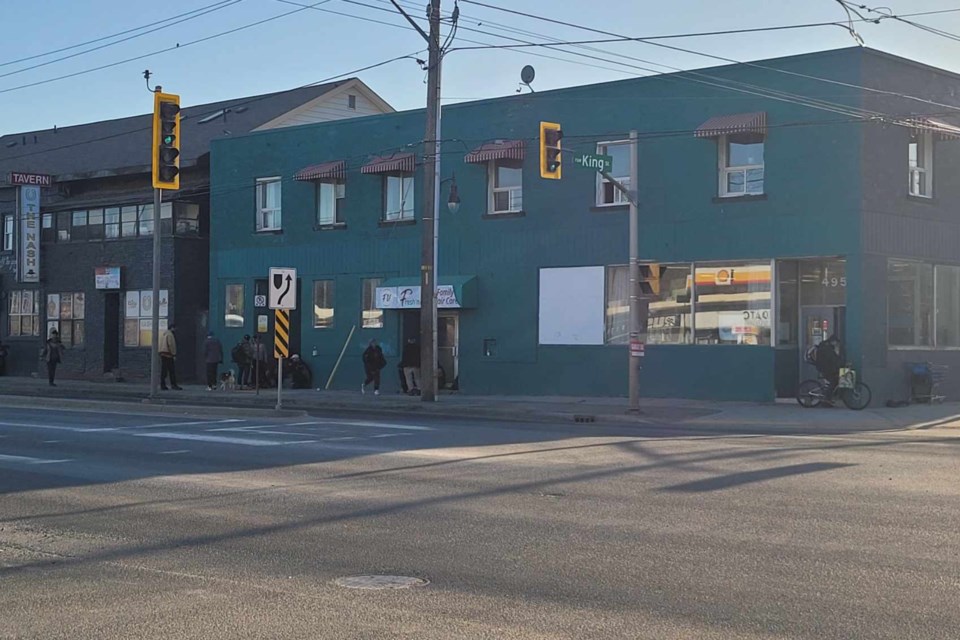The location and extended hours of a drop-in centre in the Flour Mill for people who are homeless has left residents and businesses in the neighbourhood feeling unsafe and insecure.
Sudbury.com visited the area this week following a Flour Mill Community Action Network (CAN) meeting on April 8, during which residents expressed their concern with the impact the Sudbury Centre for Transitional Care is having.
We conducted interviews with neighbourhood businesses and residents April 15 and 16. Those we spoke to highlighted several concerns, including weapons, people breaking into homes, people using drugs openly and sleeping on people’s front porches, as well as a general feeling of unease since the centre opened.
One 30-year-resident said she hated the idea of moving from her community, but said if affordable housing were available, she would.
The drop-in centre in question, Sudbury’s Centre for Transitional Care (SCTC), is a shelter of sorts for people who are experiencing homelessness, where they can get warm, get a snack, and interact with social services, like the city’s housing-focused client navigators, who routinely visit SCTC.
Located at the corner of King Street and Notre Dame Avenue, the centre has been open since 2023, but recently, city funding allowed it to extend their hours. Previously, the centre was open Monday to Friday, from 9:30 a.m. to 3:30 p.m.; it is now open seven days a week, from 8:30 a.m. to 8:30 p.m. until April 30, when the funding ends.
Jehnna Morin is the executive director of the centre. She and her staff also act as liaison between tenants and the landlord of 14 apartments at 495 Notre Dame and 18 apartments 519 Notre Dame Ave., helping tenants with income supplements, social services and teaching tenants how to maintain their housing. The apartments at 519 Notre Dame are only for people who are sober.

Though none of the 10 residents near the area of the drop-in centre were willing to speak on record, their comments were mainly divided along two lines: Some explained they saw the need for the service, but were overwhelmed dealing with the consequences. While others simply want the drop-in centre shut down.
Complaints included people going through their garbage, as well as stealing inexpensive objects, such as lawn ornaments and patio chairs, from yards or open sheds.
Three residents told Sudbury.com they have encountered a person sleeping on their porch, or at the bottom of their exit stairs.
Business owners, especially those open late, told Sudbury.com they are finding it especially difficult. Though again, none of the businesses in the area would speak to Sudbury.com on the record, they described losing business, and even employees, due to a fear of the people who use the drop-in centre.
Among the complaints of shoplifting, one business owner was allegedly stabbed in the hand by a person in the store late at night, though it is unclear if the person frequented the drop-in centre.
One business has had people using drugs camped out in a front area of their store, separated from where they do business. They stated they now have to routinely patrol the area to ensure there is no one using drugs there, or preventing customers from accessing the building.
They said they even found a gun near their dumpster area, and have had customers specifically state they no longer wish to attend the business due to people attached to the drop-in centre.
One store described having a tip jar stolen, a staff member threatened by a person who appeared intoxicated and was demanding a cab, and another man who simply entered, walked into a back area, and passed out on the floor.
One business stated that they feel if necessary, they can call Morin at the centre and ask for help with a person who is loitering, or using drugs in the area.
Of the 10 businesses Sudbury.com spoke with, three commented that calling the police felt futile, as “either they’ll take too long to get here and the issue is over, or the person just comes back the next day.”
The situation appears to be focused in the King Street and Notre Dame Avenue areas, bordering the drop-in centre. All the businesses and residents Sudbury.com spoke with whose location was at least a two blocks away from the drop-in centre said they have had no issues.
At midday on April 15 and 16, while walking the area at least two blocks from the centre on all sides, there was a great deal of garbage, though some of it appeared to be the usual residual garbage from the spring thaw.
There was scattered evidence of drug paraphernalia, including two syringes in one laneway near the centre. Along a fence line that separates a business from a home, there were five tinfoil pieces and three”‘stems”. Tinfoil is used to smoke crack-cocaine or methamphetamines: the substance is placed on the tin foil and lit from below the foil; stems, resembling a straw around 4-6 inches in length, is used to inhale the smoke from the substance on the foil.
Sudbury.com encountered two people using substances in two different areas near the centre: both people were polite when we stumbled upon them, and one, after requesting no photos, wished us a good day.
The drop-in centre’s recent funding extension
Gail Spencer, city manager of housing stability and homelessness, told Sudbury.com the new funding for the centre to increase its hours flowed from federal Reaching Home funding. It was a one-time influx announced in late November, and it meant $436,070 coming to Sudbury through the Winter Unsheltered Homelessness program.
Spencer noted the significant increase in the number of unsheltered people on the city’s by-name list, and said the funding, as described by Infrastructure Canada, was to enable communities to “invest in a range of eligible activities that will keep people experiencing unsheltered homelessness safe and find a more stable place to stay this winter.”
“So it was a very targeted piece of funding,” said Spencer.
The money was split between several services, beginning in January with funds going to the main branch of the Greater Sudbury Public Library, the Elgin Street Mission, the Samaritan Centre, and Grace Family Church, as well as SCTC.
The funds had to be spent before April 30.
Spencer said if the funding was long-term, or for a higher amount, a request for proposal (RFP) would have been issued, but because the funds needed to be spent quickly, the city chose existing facilities to fund. SCTC received $75,125, which extended the hours of the centre beginning March 5. The funds will last until April 30.
Spencer said SCTC was recommended by “a number of our community partners,” and that they met with Morin and considered their well-established oversight and previous provincial funding.
SCTC is also required to submit backup of expenses from their delivery of services for the city.
Spencer also noted the role of client navigators, and how the centre is helping.
“Our client navigators attend at the drop in regularly to meet with clients,” she said. “It's been a really great resource for those of us who are trying to support people and to help them to take the steps they need to get to housing.”
Jenny Lamothe covers vulnerable and marginalized populations for Sudbury.com
